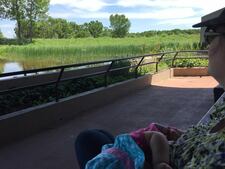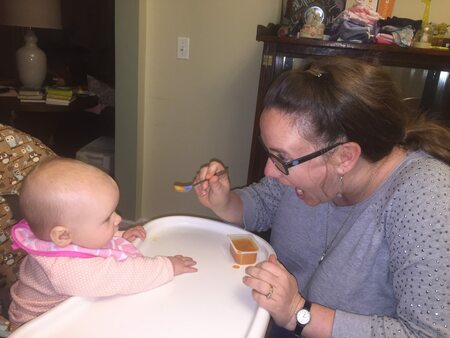I am in countdown mode. I leave for our intergenerational Peacemaking trip on Sunday, a mere three days from now. This will be the first time I've been away from my nearly 13-month old daughter for longer than a few hours since she was born. In anticipation of this milestone, shortly after her first birthday, we began the weaning process.
The first week, we went down to nursing 4 times a day; the second week, we reduced to three; the third week to two and finally, this week, to one. That means that after nearly 13-months of nursing my daughter – exclusively during her first six months – we'll only nurse three more times.

Every time I allow myself to think about that, tears fill my eyes. After the initial challenge of it (and make no mistake, it certainly was a challenge), nursing Hope has been one of the best things I've ever done. It bonded us. It gave me a tangible way to comfort and provide for her. It enabled me to deliberately pause throughout the day and savor the simple moments with my daughter, a choice I will never regret.
I used to look at moms who chose to continue to nurse their toddlers with horror. Since I didn't understand the nursing relationship, it was easy for me to judge them. Now, I'm pretty convinced that if it weren't for the Peacemaking trip, I would have become one of them (and don't get me wrong – I would have loved to. I now have the utmost respect for moms who continue to breastfeed their child past when our American society deems it to be socially acceptable.)
Yet, there's another side to this.
My milk is no longer the only thing my daughter needs. Exclusively breastfeeding – or even primarily breastfeeding – my daughter is no longer in her best interest.
At Hope's one-year doctor's visit, the nurse weighed her, looked at Hope's record, and then exclaimed with worry in her voice, “She's actually lost weight.”
A few minutes later, she reentered our room and calmly said, “Which scale did they weigh Hope on last time?”
When I pointed out a scale other than the one she'd just been weighed on, the nurse looked at me with relief and said, “Let's redo her weight. All these scales are calibrated differently and that can make a difference.”
So she marched Hope out to the other scale and weighed her again.
The scale confirmed she'd lost weight since her 9-month visit.
At that point, I sensed (or maybe projected) a rising level of concern in the nurse's voice and my conversation with her. When the doctor walked in a few minutes later, she immediately said, “Let's see what's going on with her weight.”
Her exam revealed no other concerns, especially after she realized Hope could walk (and had been for a while at that point). She quickly hypothesized that because Hope is extremely active, it's been hard for her to gain weight. With that in mind, she walked through Hope's diet trying to figure out whether or not Hope was getting enough calories to support growth.

Even though we'd begun introducing Hope to solids at 6 months, since breastfeeding was still going well at Hope's first birthday, that was still her primary nutrition. We'd taken the doctor's frequent mantra literally: “All a baby needs her first year is breastmilk. We just introduce solids to get them used to different tastes and textures.” Hope's introductions to solids had, therefore, been slow. At 11 months, she was eating only limited table foods. By her first birthday, she was still a vegetarian.
Upon hearing this, the doctor quickly said, “Let's get this girl some meat!”
So we did.
We introduced Hope to salmon, chicken, pork, and turkey.
Three weeks later, she's almost exclusively a carnivore. This girl LOVES meat.
Although we haven't taken Hope back to the doctor for her weight-check yet, it's obvious she's gained weight. The 12-month clothes that were hanging loosely on her at her first birthday now fit snugly. Her delightful belly and thigh rolls have also returned.
Clearly, this girl needed protein. She needed more than what my milk could provide.
Knowing this has actually made weaning less traumatic for me. (I might add, Hope remains unscathed by this process.)
By breastfeeding my daughter for her first year, I did what was best for my her... And me. And now, by weaning her, I'm still doing what's best for her.
As I've been wrestling with this – and all the emotions that have come with it – I've found myself reflecting often on Hebrews 5:12-14, “In fact, though by this time you ought to be teachers, you need someone to teach you the elementary truths of God’s word all over again. You need milk, not solid food! Anyone who lives on milk, being still an infant, is not acquainted with the teaching about righteousness. But solid food is for the mature, who by constant use have trained themselves to distinguish good from evil.”
In faith, as in life, we need both milk and solid foods. A follower of Christ who relies only on milk never matures. I've seen this over and over again in my work as a youth pastor. Spiritual growth requires people to go beyond superficial understandings and dig deeply into the word of God. Spiritual growth necessitates that you stop taking someone else's word for it and instead decide for yourself what you believe and why.
The same is true of physical growth. In order for my daughter to grow and thrive, she can't continue nursing. She needs more sustenance. She needs big people food – meat and solids.
So Sunday morning, when I nurse for the last time, I'll cry. I'll mourn the passing of this phase of my daughter's life, unsure of whether or not I'll ever nurse another child. Yet, I'll also celebrate the goodness of this gift – of my daughter and of our nursing relationship. I'll rejoice in the fact that we're entering a new stage in our relationship – a stage that will enable her (and I!) to continue to grow, thrive, and mature.